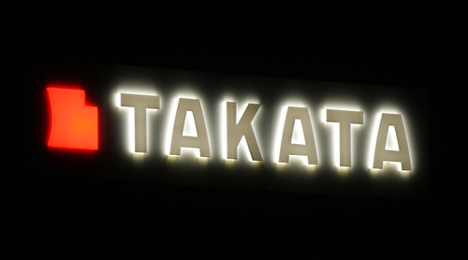Takata hit with NHTSA’s largest-ever civil penalty

By subscribing, you agree to receive communications from Auto Remarketing and our partners in accordance with our Privacy Policy. We may share your information with select partners and sponsors who may contact you about their products and services. You may unsubscribe at any time.
WASHINGTON, D.C. –
Two-hundred million dollars. That’s the high end of the fine that vehicle-part manufacturer Takata will have to pay the Department of Transportation’s National Highway Traffic Safety Administration for its indiscretions in violating the Motor Vehicle Safety Act with its handling of defective airbag inflators.
With an initial penalty of $70 million due in cash, the remaining $130 million imposed by the fine would become due if Takata fails to meet its commitments in remedying the situation or if additional violations of the Safety Act are discovered.
According to the U.S. Department of Transportation, this is the largest civil penalty in NHTSA’s history.
“For years, Takata has built and sold defective products, refused to acknowledge the defect, and failed to provide full information to NHTSA, its customers, or the public,” said Transportation Secretary Anthony Foxx. “The result of that delay and denial has harmed scores of consumers and caused the largest, most complex safety recall in history. Today’s actions represent aggressive use of NHTSA’s authority to clean up these problems and protect public safety.”
In addition to the fine, the consent order requires Takata to phase out the manufacture and sale of inflators that use phase-stabilized ammonium nitrate propellant, which DOT believes to be a factor in the explosive ruptures that caused seven deaths and nearly 100 injuries in the U.S.
The consent order also lays out a schedule for recalling the airbags that are still actively in use, unless the company can prove they are safe or show otherwise why it has determined its inflators are prone to rupture.
Subscribe to Auto Remarketing to stay informed and stay ahead.
By subscribing, you agree to receive communications from Auto Remarketing and our partners in accordance with our Privacy Policy. We may share your information with select partners and sponsors who may contact you about their products and services. You may unsubscribe at any time.
In addition to admitting to being aware of the defect and failing to issue a timely recall in the consent order, Takata will also experience what the DOT considers “unprecedented oversight” for the next five years, which will include an independent monitor selected by NHTSA to assess, track and report the company’s compliance with the phase-out schedule and the other requirements of the consent order while also overseeing what the DOT calls its Coordinated Remedy Program.
“Today, we are holding Takata responsible for its failures, and we are taking strong action to protect the traveling public,” said NHTSA Administrator Mark Rosekind. “We are accelerating Takata recalls to get safe air bags into American vehicles more quickly, ensuring that consumers at the greatest risk are protected, and addressing the long-term risk of Takata’s use of a suspect propellant.”
According to the DOT, a separate Coordinated Remedy Order was issued to Takata and the 12 other vehicle manufacturers involved in the existing Takata recalls.
The department said it directs those involved to prioritize their remedy programs based on risk and establishes a schedule by which they must have sufficient parts on hand to remedy the defect for all affected vehicles. The order establishes the aforementioned Coordinated Remedy Program which says NHTSA will oversee the supply of remedy parts and manage future recalls with the assistance of an independent third-party monitor.
Under the Coordinated Remedy Order, DOT says, vehicle manufacturers must ensure they have sufficient replacements on hand to meet consumer demand for the highest-risk inflators by June 2016, and provide final remedies for all vehicles — including those that will receive interim remedies because of supply and design issues — by the end of 2019.
Kelley Blue Book senior analyst Karl Brauer says this all sounds like a small step toward a solution instead of a be-all and end-all resolution.
“It’s interesting to see Takata fined while so many questions remain unanswered,” Brauer said. “We still don’t have confirmation on what exactly is causing the problem with these inflators, and we still don’t know the full extent of the vehicles involved. The recent recall of Takata airbags in new GM, Honda and Volkswagen models suggests there could be an ongoing problem with the bags’ fundamental design. This feels like a single step in a larger process, rather than a resolution to the issue.”


